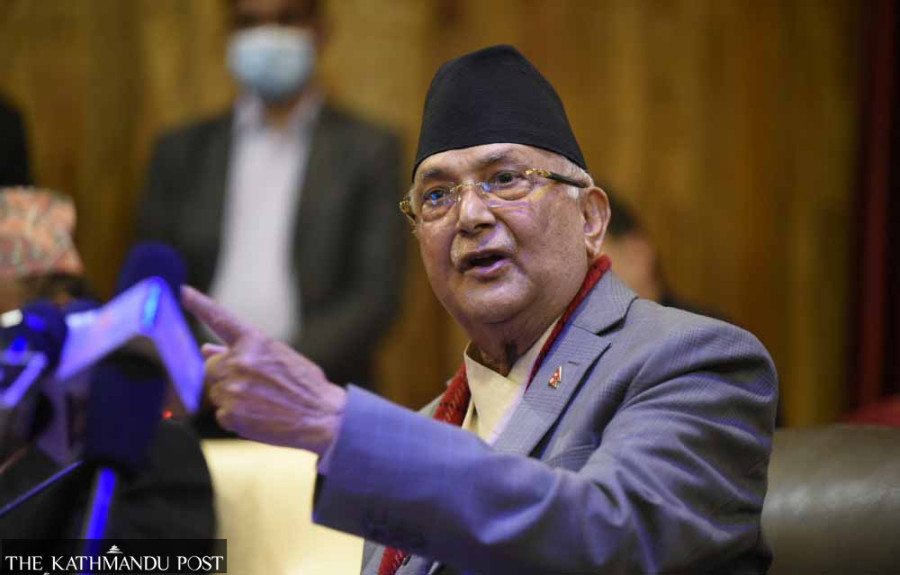Politics
Oli attacks Dahal, Nepal, avoiding criticism of MCC
UML, which stayed out of US aid passage process, stresses implementation.
Tika R Pradhan
The main opposition CPN-UML has taken a middle way on the Millennium Challenge Corporation Nepal Compact, two days after it was ratified by Parliament amid the party’s obstructions, neither hailing the move nor criticising it. The party, however, questioned the process, which it chose to stay away from.
Four coalition partners Nepali Congress, Communist Party of Nepal (Maoist Centre), CPN (Unified Socialist), Janata Samajbadi Party on Sunday voted to ratify the $500 million American compact along with an “‘interpretative declaration.”
The UML on Tuesday said that the ruling coalition’s ‘interpretative declaration’ was just a ploy to deceive people and that it was a ridiculous move on the part of the ruling coalition to clarify something that is already in the agreement.
“To say that the agreement between the two governments can be amended by a unilateral interpretation after almost half a decade of agreement is a misguided attempt to deceive the people, and it is ridiculous,” said Pradeep Gyawali, the deputy general secretary, while reading out party chair KP Sharma Oli’s statement at a press conference in Kathmandu.
“In this regard, the MCC itself has made it clear that such so-called declarations will not make any difference in the agreement. But some leaders are still trying to propagandise the ‘explanatory declaration’ as a vaccine to amend the MCC agreement, which they said was wrong yesterday. This is another ploy to confuse the people.”
Though the UML was for parliamentary ratification of the MCC compact signed in September 2017, it had decided not to make a position on it ever since its chair Oli was ousted as prime minister in July last year.
The compact was registered in Parliament in July 2019 when Oli was prime minister.
When the Sher Bahadur Deuba government prepared to table the compact for its ratification, it maintained that it would make its position clear only after it was tabled.
During Sunday’s deliberations and voting on the compact, the UML continued its House obstructions. It, however, did not create any hurdles in its passage.
The UML said on Tuesday that since the compact has been ratified, it should now be implemented ensuring that it won’t go against national interest.
“The MCC project agreement has been approved by the Parliament. Now it needs to be implemented in a way that does not go against our national interest,” said Oli. “It will be detrimental to the country if further divisions are created about a project that has already been endorsed by the House.”
Oli on Tuesday blamed Maoist Centre chair Pushpa Kamal Dahal and Unified Socialist chair Madhav Nepal for weaponising the MCC compact against him by raising issues like national interest.
The MCC was signed by the Sher Bahadur Deuba-led government in September 2017 which was backed by Communist Party of Nepal (Maoist Centre) after a long exercise from the previous governments.
Oli said some parties in the ruling coalition deployed their cadres on the streets for violent protests while they endorsed the MCC without revisions just to save the Speaker and those like Madhav Nepal as well as to remain in power.
“Can nationalism be exchanged with the positions [of individual leaders]?” said Oli referring to Madhav Nepal and Dahal and Speaker Agni Sapkota.
The statement issued by the UML says that “we should all be clear about the fact that there were deliberate misinformation campaigns against MCC launched with the aim of ousting the then Nepal Communist Party chair and prime minister KP Sharma Oli.”
“That was ill-intentioned and unnecessarily ridiculed and divided the Nepali people for almost three years,” reads the statement. “An unimaginable chasm of mistrust was created among Nepalis through the artificial controversy created by rumours by some with ulterior motives.”
The UML has accused the government of keeping it out of the entire MCC ratification process. However, it was the party that chose to remain out of the process.
Oli said that the current coalition was born out of an unnatural alliance and that it is bent on derailing the constitution.
“We are concerned about democracy and the constitution,” said Oli who did not offer any hints as to how.
The current alliance was formed after Oli’s second House dissolution in May last year, which was overturned by the Supreme Court in July last year, calling it an unconstitutional move.
Hinting at Dahal, with whom Oli once shared chairman’s post in the NCP, Oli said he often wonders why people follow someone who keeps on changing his stance.
Dahal over the past weeks has changed his position multiple times over the MCC compact. His duplicity was exposed when a letter he wrote to the MCC headquarters was leaked, in which he, along with Deuba, clearly sought time to ratify the grant agreement. All the while, he instigated his party members against the compact.
According to Oli, some parties in the coalition have called the MCC agreement treasonous, and thus incited their cadres and created confusion among the people and they made poisonous propaganda.
“A bilateral issue was turned into a geopolitical matter,” he said. “They did everything they could to use the MCC as a weapon against the UML… just to save the coalition, as a breakdown of the alliance could have led to their fallall.”




 14.24°C Kathmandu
14.24°C Kathmandu














